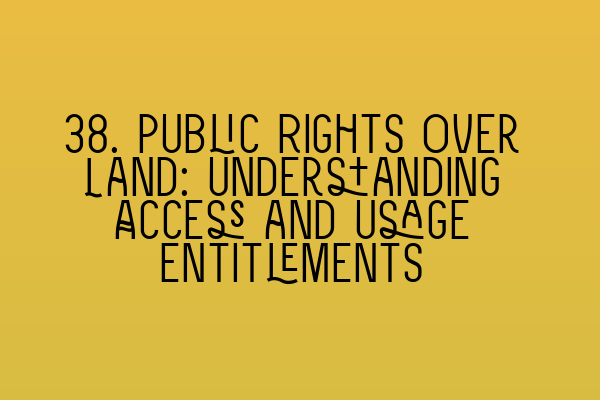38. Public Rights Over Land: Understanding Access and Usage Entitlements
Welcome to the SQE Property Law & Land Law blog! In this article, we will delve into the intricate world of public rights over land. As a solicitor, understanding access and usage entitlements is crucial to effectively advising clients on property matters. Whether you are studying for your SQE exams or seeking practical insights into this area of law, this article will provide you with valuable information.
What are Public Rights Over Land?
Public rights over land refer to the legal entitlements that individuals or groups have to access and use certain areas of land that are deemed public or privately-owned. These rights are established through a combination of legislation, common law, and historical usage.
It is important to note that public rights over land differ from private rights, which are typically attached to specific landowners or occupiers. Public rights, on the other hand, can be enjoyed by any member of the public, subject to certain conditions and limitations.
Types of Public Rights Over Land
Public rights over land can take various forms, including:
- Right of Way: This is perhaps the most well-known public right over land. It grants individuals the legal right to pass through a piece of land, such as a pathway or road, that is owned by someone else. The right of way can be on foot, by vehicle, or even by livestock in some cases. Understanding the intricacies of right of way is essential in many property transactions and disputes.
- Access to Common Land: Common land refers to areas of land that are owned collectively by a community or group of individuals. It can be accessed and used by the general public for specific purposes, such as recreational activities or grazing livestock. Public rights to access and use common land can be subject to specific regulations and local bylaws.
- Right to Fish: In certain cases, individuals may have the right to fish in rivers, lakes, or other bodies of water, subject to local laws and regulations. This right can be considered a public right over water and adjoining land.
- Rights of Navigation: Public rights of navigation grant individuals the right to navigate waterways, such as rivers and canals. This can include activities such as boating, canoeing, or sailing. The specific rights and restrictions regarding navigation can vary based on the jurisdiction and the waterway in question.
- Public Access to Beaches: In coastal areas, the public may have a right to access and use certain beaches and foreshore areas. These rights can be influenced by local laws and regulations, as well as any rights granted to landowners or occupiers.
These are just a few examples of the public rights over land that exist in various jurisdictions. It is important to consult local legislation and case law to fully understand the extent and limitations of these rights in a particular context.
Legal Considerations and Disputes
Legal considerations and disputes may arise when public rights over land conflict with the rights and interests of landowners or occupiers. It is essential for solicitors to have a deep understanding of the relevant legislation, case law, and local regulations to effectively navigate these complexities.
For example, disputes may arise regarding the establishment or existence of a public right of way. Landowners may attempt to restrict or block public access, while individuals or groups may assert their legal entitlement to pass through. Solicitors can play a crucial role in advising their clients on their rights, obligations, and potential remedies in such situations.
Preparing for Your SQE Exams
For aspiring solicitors, studying for the SQE exams requires a comprehensive understanding of property law and land law, including public rights over land. To enhance your preparation, we recommend exploring the following resources:
- Check out our SQE 1 Practice Exam Questions to test your knowledge and understanding of property law concepts.
- Access our SQE 1 Practice Mocks FLK1 FLK2 to gain valuable insights into the format and structure of the SQE exams.
- Explore our comprehensive SQE 2 Preparation Courses to deepen your knowledge of land law and other relevant subjects.
- Take advantage of our dedicated SQE 1 Preparation Courses to develop a solid foundation in property law and other key areas of legal practice.
- Stay updated with the latest SRA SQE Exam Dates to effectively plan and manage your study schedule.
We hope that this blog post has provided you with a valuable overview of public rights over land and their significance in property law. Remember, as a solicitor, your expertise in this area is essential in advising clients and resolving disputes. Stay tuned for more insightful articles from SQE Property Law & Land Law!
